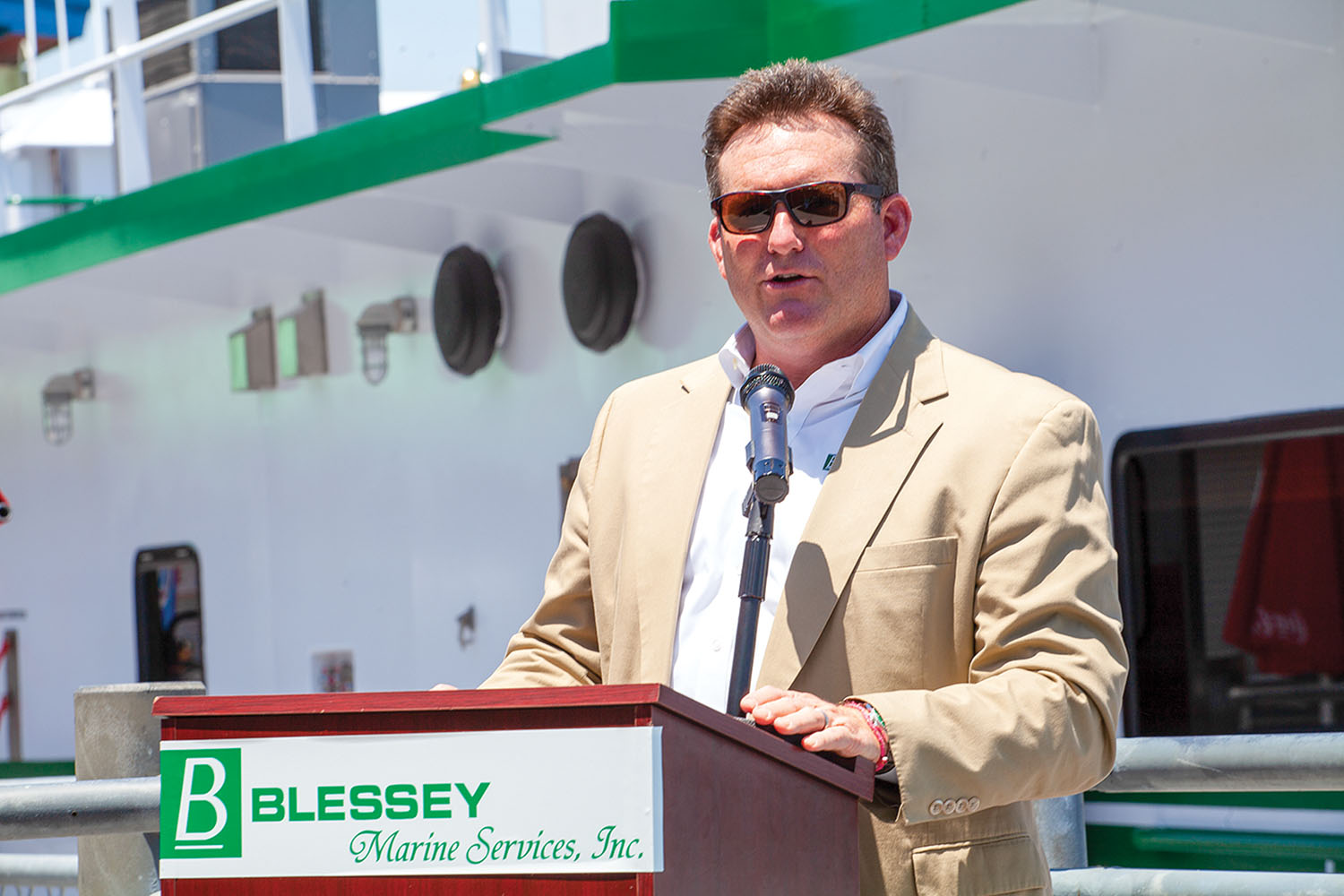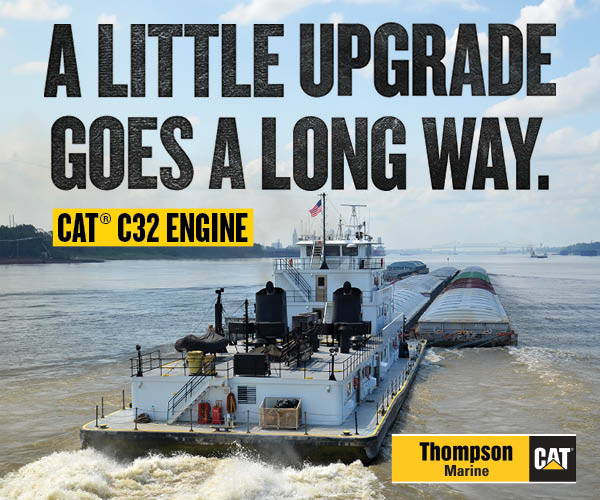Clark Todd has been president of Blessey Marine Services, a New Orleans-based towboat and barge company specializing in the transport of tank barges, since 2007. In December 2021, he also assumed the role of chief executive officer, succeeding company founder and chairman Walter Blessey Jr.
Since May 2022, Todd has served as chairman of The American Waterways Operators (AWO), a trade association representing the U.S. tugboat, towboat and barge industry at work in the nation’s rivers, coastal harbors, canals and the Great Lakes.
Todd recently spoke with The Waterways Journal about his priorities as AWO chairman, challenges and opportunities facing the maritime industry and some of the things that make Blessey Marine special.
In his first remarks as AWO chairman, Todd said he wanted his time in that role to have an overarching focus “to put people first by making sure our industry is focused on mariners over markets.” That’s not just a catchy phrase for Todd. It’s been a theme of Blessey Marine since its founding, he said.
“The family environment is very unique here at Blessey,” Todd said, “and I am proud to lead the charge for the second generation, continuing just as Walter Blessey did when he started the company years ago. Our open-door policy applies to each of our employees, which includes the crews having the cell phone numbers of ownership and senior management so they can call if ever and whenever they desire.”
Many times, Todd said, those calls amount to a simple check-in like, “Hey Clark, I just wanted to say ‘hello’ and see how you were doing.” Other times, it’s something related to operational concerns. That access is a critical part of the company’s family atmosphere.
“The inspiration for this philosophy came from Walter as he worked his way up through different companies,” Todd said. “He wanted to create an atmosphere that was the opposite of what he had experienced early on in his career. So when he founded Blessey Marine, he created our ‘Corporate Purpose Statement,’ which we still live by every day. He created his company and the family atmosphere through his actions and how he treated his employees. As president and CEO, I promised to continue this practice, and our entire management team practices this as well.”
Todd said he sees something similar in the way AWO members are able to access leadership.
“The evolution of AWO over the years has been significant, and under the guidance of Jennifer Carpenter, the leadership has really opened the lines of communication amongst the membership to be inviting and inclusive,” he said. “The benefits of these types of collaborations are invaluable.”
Top Priorities
When Todd was elected chairman of AWO, he named mariner safety, decarbonization and labor availability as three main priorities he wanted to highlight. Mariner safety, like Blessey Marine’s open-door policy, goes back to Todd’s “mariners over markets” mantra.
“We owe it to our mariners, to their families and to our customers to continue to ensure that our mariners make it home safely after each hitch,” Todd said. “It is easy to say that it is our responsibility as owners and operators to take care of our folks, but it is much more than that. I want to lay my head on my pillow at night knowing that our family business truly stands behind our safety record and that we support our mariners by doing whatever is possible to ensure their safety.
“The men and women who are away from their families most of the year—and who are doing the difficult jobs out there—they are the heart and soul of our maritime transportation industry,” he added.
Sustainability and decarbonization are both key topics throughout the country, and the maritime industry is no different. And in a sense, the industry already has a good story to tell.
“The inland industry is already the most environmentally friendly mode of transportation when compared to truck and rail,” Todd said. “We have to ask ourselves, ‘Within the current operating environment, what are some easy decarbonization targets, and what are our longterm ‘shoot the moon’ goals?’”
Todd noted how vessel architects, engine manufacturers and shipyards have all developed groundbreaking concepts to achieve greater levels of decarbonization over the past few years. “Future fuels” in discussion include hydrogen, solar, electrification and alternative “drop-in” fuels like ammonia or bio and synthetic diesel.
“However, from an ownership perspective, we have to find a balance between the cost of implementing these concepts for reducing emissions, the current market structure and, most importantly, developing the infrastructure with common sense investment and goals in mind,” Todd said.
And much work can be done in pursuing those goals. AWO member companies, already diverse in size, expertise and areas of operation, are just as diverse in terms of their sustainability journey, Todd said. In that diversity, the organization finds strength.
“Some operators are much farther along in their journey than others, so we will look to them whenever possible for any helpful tips and guidance that can be shared among the membership,” Todd said. “AWO has developed a CEO-level Sustainability Task Force that looks at the obstacles and opportunities for our industry, while taking into account all of our membership needs. The task force supports AWO leadership with a number of recommendations, which include telling our positive story and securing a seat at the table as a proactive partner.”
The customers of towboat operators, including the oil and gas industry, grain industry and metals industry, are also setting sustainability targets, Todd said, and have been willing partners in providing guidance on issues related to the inland marine industry.
Finding Workers
Another critical issue for the maritime industry—and across the entire economy—is the ongoing labor shortage. The maritime industry is not immune to labor woes plaguing the country right now, but creativity and, again, having a good story to tell are leading to success in the recruitment and retention of employees, including vessel crew members.
“Many of our companies, including Blessey, now have full-time talent recruiters on staff to fill this void, and if you pay attention to social media, recruitment efforts on those platforms are robust across the industry,” Todd said. “Younger folks do not respond to traditional recruitment methods the same way as older generations. Companies need to be creative. I’m incredibly proud of the job that we have done.”
Todd praised AWO, his Blessey Marine team and towing industry competitors for producing engaging videos that give a snapshot of what the industry does and what working on the nation’s waterways is all about.
“We need to show how generations of mariners built careers on the water and how that dynamic is still a beneficial one for hardworking Americans,” he said.
But recruitment and retention are two different challenges, Todd said, and to meet the current retention challenge requires relevant action.
“Although it may seem easy, retention is more and more difficult because of the younger generations who just do not want to be away from home,” he said. “As a company and an industry, we have increased day rates in an attempt to be competitive in the days of higher wages at local fast-food chains, home improvement centers and gas stations.”
Besides those challenges, operators are also preparing for Subchapter M-related drydocking and adjusting to the near-term and long-term impacts of supply chain disruptions from the pandemic. Those supply chain issues have driven up the cost of construction for companies looking to add to their fleet. Speaking for Blessey Marine, Todd said, while the company has added a pair of new retractable towboats to its fleet in the past year, there’s nothing definite in the queue, for now.
“As of now, we may look to build some equipment in the coming year, but only as replacement to swap out older equipment,” Todd said. “But that is also dependent on the price of steel coming down to a reasonable rate. We have a fairly pragmatic business model, yet we would be foolhardy if we were not evaluating business opportunities, whether they are equipment acquisitions, expansion of product lines or trade lanes, etc.”
Caption for photo: Clark Todd, president and CEO of Blessey Marine Services, was elected chairman of The American Waterways Operators in May 2022. (WJ file photo by Frank McCormack)



